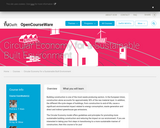
Building construction is one of the most waste producing sectors. In the European Union, construction alone accounts for approximately 30% of the raw material input. In addition, the different life-cycle stages of buildings, from construction to end-of-life, cause a significant environmental impact related to energy consumption, waste generation and direct and indirect greenhouse gas emissions.
The Circular Economy model offers guidelines and principles for promoting more sustainable building construction and reducing the impact on our environment. If you are interested in taking your first steps in transitioning to a more sustainable manner of construction, then this course is for you!
In this course you will become familiar with circularity as a systemic, multi-disciplinary approach, concerned with the different scales, from material to product, building, city, and region.
Some aspects of circularity that will be included in this course are maximizing reuse and recycle levels by closing the material loops. You will also learn how the Circular Economy can help to realign business incentives in supply chains, and how consumers can be engaged and contribute to the transition through new business models enabling circular design, reuse, repair, remanufacturing and recycling of building components.
In addition, you will learn how architecture and urban design can be adapted according to the principles of the Circular Economy and ensure that construction is more sustainable. You will also learn from case studies how companies already profitably incorporate this new theory into the design, construction and operation of the built environment.
- Subject:
- Applied Science
- Architecture and Design
- Engineering
- Material Type:
- Full Course
- Provider:
- Delft University of Technology
- Provider Set:
- Delft University OpenCourseWare
- Author:
- A. Sabbe
- Dipl.ing. U. Hackauf
- Dr. A. Wandl
- Dr.ing. M. Bilow
- Dr.ing. T. Konstantinou
- Dr.ir. E. Leclercq
- Ir. M. Smit
- Prof.dr.ir. T. Klein
- Date Added:
- 04/30/2020